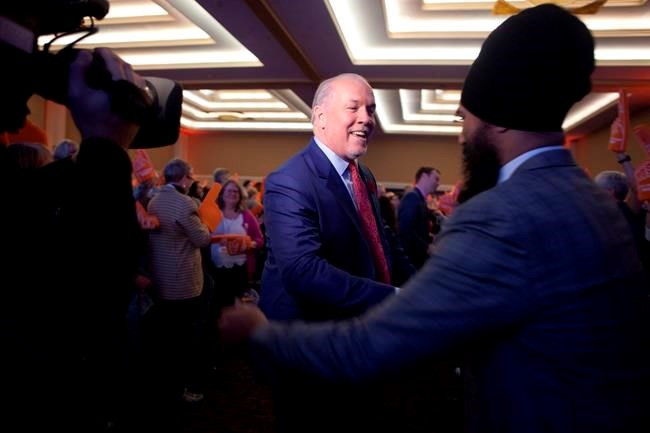With orange foam fingers pointed skyward, about 2,000 delegates cheered Premier John Horgan and newly elected federal NDP Leader Jagmeet Singh to the stage at the B.C. NDP convention in Victoria on Saturday.
It was Singh’s first appearance on Vancouver Island since becoming party leader. He said the federal NDP is looking to B.C. as it tries to rebuild after the 2015 election, which saw it knocked from its position as the official Opposition.
“With the New Democratic government, we’re going to be able to point to a lot of the successes here in B.C. as an example of what we can achieve at the federal level as well,” Singh said.
“So it’s a province where I’m hoping to continue to work, where I hope to be an ally in helping the provincial government, but also one that I hope can help us at the federal level, as well.”
But showing support in B.C. could cause problems for Singh in another NDP province, Alberta.
Horgan and Alberta NDP Premier Rachel Notley have clashed over the future of the Trans Mountain pipeline expansion. Singh said he agrees with Horgan that the project’s risks outweigh its benefits.
Horgan clarified that Singh won’t play referee. “The federal and provincial parties are separate. I don’t take orders from Jagmeet, nor does he take direction from me,” Horgan told reporters.
The convention, which continues Sunday, is the first since the party returned to power after 16 years of Liberal governments.
It comes as the provincial party faces tough decisions, including whether to continue with the Site C hydroelectric dam project or pull the plug and remediate the site. Site C was a signature job-creation and power-generation plan of former Liberal premier Christy Clark.
Horgan’s speech Saturday focused on positives and gave little hint about the direction his government will take on Site C, beyond saying the decision is “one of the toughest our government will make.” Cabinet is considering a B.C. Utilities Commission review of Site C, First Nations consultations and geotechnical information as it figures out what to do, he said.
Requesting a review of Site C was one of the Horgan government’s first moves after taking office in July. Since then, the party has initiated at least a half-dozen reviews and consultations on subjects ranging from marijuana regulation to eliminating Medical Services Plan premiums.
Some convention participants said they want quicker action.
Irene Lanzinger, president of the B.C. Federation of Labour, indicated that there are limits to her patience when it comes to a $15 minimum wage, saying the government is moving too slowly.
Another delegate lamented a resolution to create a “comprehensive plan to make post-secondary education affordable and accessible” for its lack of specific action.
The Island coloured much of Horgan’s speech, which included reference to a solar project by the T’Souke Nation and the land-sharing agreement by the Beecher Bay First Nation, Metchosin and Langford.
When it comes to the government’s review of B.C. Ferries, “everything is on the table,” he said. “As a premier from Vancouver Island, I think I have a better appreciation than previous premiers of the importance of the ferry system, but we’re going to make sure it’s fair for everybody.”
= = =
Many of the resolutions at the B.C. NDP convention cover familiar territory: action for renters, fighting the drug overdose crisis, $15 minimum wage. Others are topics that get less glory. Here's a sampling:
Add food addiction to the portfolio of the Ministry of Mental Health and Addictions
Support a federal bill exonerating Louis Riel for his 1885 hightreason conviction
Establish a multicultural committee for the party
Develop a plan to eliminate parking fees at hospitals
Make all forms of prescription birth control available to all British Columbians at no cost
Ask the B.C. Utilities Commission or other body to evaluate the true costs to ratepayers of the B.C. Hydro smart meter program
Create an expert panel to confront and defeat sources of hate speech
Update international symbol of access to support persons living with disabilities, because the symbol of an idle and immobile individual in a wheelchair reinforces a "helpless" stigmatization
A broad move to improve affordability of low-and middleincome families, dubbed the "B.C. Liberal Elitism" resolution, "because for 16 years the B.C. Liberals chose to make life better for their elite friends and insiders, while making ordinary British Columbians pay for it."



